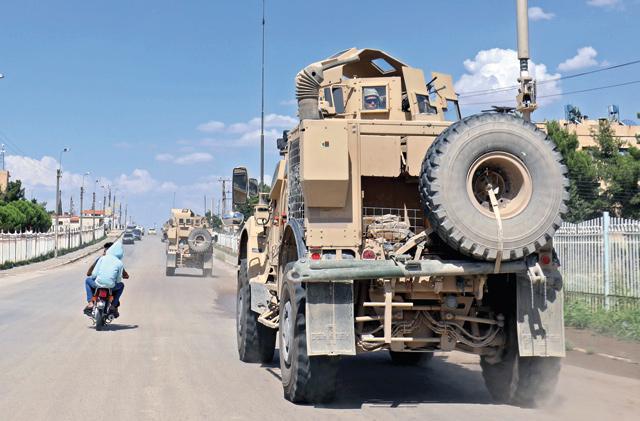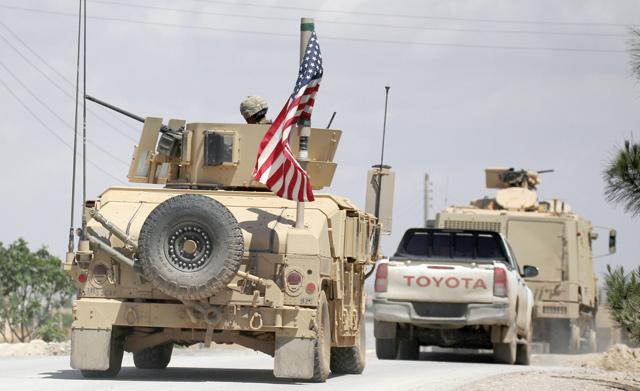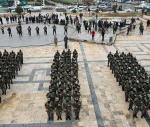You are here
Militia in Syria’s Manbij ‘will not accept’ Turkish military presence
By Agencies - Jun 07,2018 - Last updated at Jun 07,2018

Vehicles from the US-led coalition battling the Daesh militant group patrol the town of Rmelane in Syria's Hasakeh province on June 5 (AFP photo)
BEIRUT/ANTALYA — The militia controlling the flashpoint north Syrian town of Manbij said on Wednesday it would not accept any Turkish military deployment there, Reuters reported, after Ankara and Washington said they had reached an agreement for administering the area.
"We will not accept that," said a spokesman for the Manbij Military Council, a militia allied to the US-backed Syrian Democratic Forces (SDF) in northern Syria, when asked by Reuters if it would accept a Turkish military presence in the area.
It said in an earlier statement it did not know the details of the Turkey-US roadmap for Manbij announced on Monday, but added it was capable of preserving the security and borders of the town against any external threats, Reuters reported.
The fate of Manbij has been a focus of friction between the United States and Turkey because of the presence there of the YPG, a Syrian Kurdish force which is the most powerful militia in the SDF but which Ankara regards as a terrorist group.
The YPG said on Tuesday its military advisers would leave the town, and the Manbij Military Council said this would occur “in the coming days”.
Ankara has been angered by US support for the YPG-dominated SDF, and pledged earlier this year to drive the Kurdish group from Manbij by force, raising the possibility of confrontation with American forces in the area.
Also on Wednesday, Turkey’s foreign minister said that the road map agreed with Washington for the withdrawal of the YPG will rebuild trust between the two NATO allies, Agence France-Presse reported.
Cavusoglu told Agence France-Presse in an interview that the move was a key part of rebuilding ties with Washington damaged by a string of rows including Syria and also issues such as American citizens detained in Turkey.
“The US couldn’t keep its promises in the past. But I think they also understood that it is a very critical issue, and this is why we agreed to work,” Cavusoglu told AFP in his home southern region of Antalya where he is campaigning for Turkey’s June 24 elections.
“The implementation of this roadmap will help us actually to rebuild the mutual trust between two allies,” he added.
But he warned that the plan now had to be implemented on the ground. “If not, there will be a lack of trust,” he said.
Tensions between Washington and Ankara have so far scotched expectations of a strong alliance emerging between President Donald Trump and his Turkish counterpart Recep Tayyip Erdogan.
‘Time to implement’
Cavusoglu expressed scepticism over the vow to withdraw by the YPG, who Turkey accuses of being the Syrian branch of the outlawed Kurdistan Workers’ Party, Agence France-Presse reported.
“I’m not sure they are leaving,” said Cavusoglu.
“I have seen that in the press, but in the past also the US had told us that they had left and they didn’t. For me, what the YPG is saying is no kind of truth. We have to make sure that they leave.”
He said the aim of the roadmap is to ensure that the YPG leaves Manbij and then have the US and Turkey work together to establish a local security structure and “decide together who is going to govern Manbij”, according to Agence France-Presse.
“This is the aim, so now it is time to implement it,” he said.
Turkish forces earlier this year ousted the YPG from the Afrin region of northern Syria in a military operation.
But Cavusoglu indicated that he wanted similar agreements with the US to prise the YPG from towns it had seized from Daesh militants with American backing close to the Turkey border.
Turkey has repeatedly accused the YPG of unbalancing the pre-war ethnic balance of towns like the former Daesh de-facto capital of Raqa which were predominantly Arab.
“Eventually they should also leave from other areas... because Raqa for instance is a 90 per cent Arab city,” said Cavusoglu.
Ankara has long opposed the YPG controlling a continuous stretch of territory on its border up to Iraq, fearing the creation of an autonomous region or even independent entity that could embolden Turkey’s own Kurds.
Related Articles
ISTANBUL — Turkey warned Monday it would carry out more strikes on a Syrian Kurdish militia if it failed to retreat beyond the Euphrates Riv
ISTANBUL, Turkey — Turkey’s ambassador to Washington was on Thursday heading back to the United States after a spat over the official inaugu
ANKARA — Turkish and US soldiers have started independent patrols in northern Syria along the line separating Turkish-controlled areas from
















